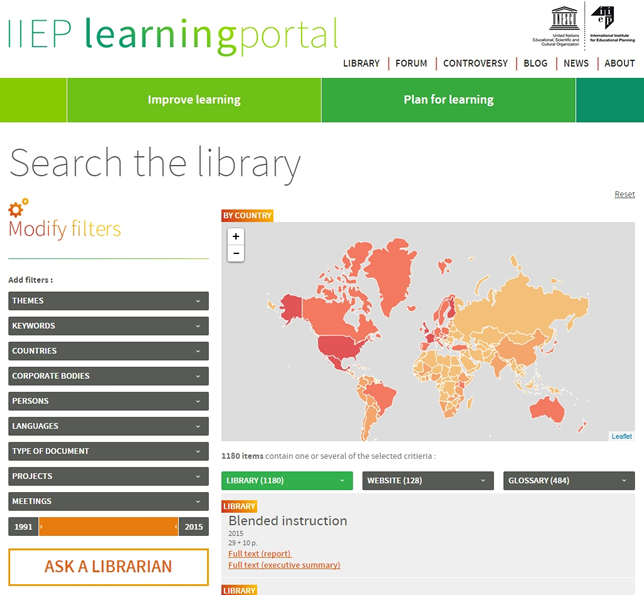New UNESCO Portal Delivers Ed Support Globally
- By Dian Schaffhauser
- 01/14/16
It may give some comfort to know that educators around the world struggle with the same challenges American teachers do — such as making sure that pre-service teachers are truly qualified enough to go into the classroom and ensuring that computing devices have sufficient infrastructure and that instructors have been sufficiently trained to put them to use for learning activities.

The IIEP Learning Portal offers summaries of and links to research on ways to improve learning, with coverage of teachers and pedagogy, learners, curriculum, schools and classrooms and education system management.
These are two topics covered along with nearly 1,200 others in a new online resource launched by the UNESCO International Institute for Educational Planning (IIEP). The IIEP Learning Portal is intended to help educators, policymakers and others make decisions for raising the quality of schooling for primary and secondary students in their own countries and schools. Materials are available in three languages: English, French and Spanish.
The freely open portal offers summaries of and links to research on ways to improve learning, with coverage of teachers and pedagogy, learners, curriculum, schools and classrooms and education system management. Cases cover the globe. In a recap on instructional time and classroom management, for instance, policy examples come from Australia, Ireland, South Africa, Swaziland and Tanzania.
The online site also provides a blog, news, a discussion forum and coverage of "controversies," such as what language students should be taught in and how to incentivize teachers. It also includes an extensive search function with multiple layers of filtering.
"There is a global learning crisis today preventing millions of children from reaching their full potential. Only by improving learning outcomes can societies truly unlock the power of education and enhance the capacities of all citizens," said IIEP director Suzanne Grant Lewis in a prepared statement. "The new portal is an important tool for countries working towards the Education 2030 agenda and will provide a range of education actors with the resources they need to improve learning outcomes."
Education 2030 is the name of a program that UNESCO, the United Nations organization focused on education, science and culture, has set up to improve education worldwide. By the year 2030 countries are expected to deliver at specific levels in several areas, including access to early childhood development, boosting literacy and numeracy and related goals.
About the Author
Dian Schaffhauser is a former senior contributing editor for 1105 Media's education publications THE Journal, Campus Technology and Spaces4Learning.